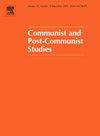Songs for Ordinary People
IF 1.3
4区 社会学
Q3 INTERNATIONAL RELATIONS
引用次数: 2
Abstract
This article aims to illuminate the links between culture and class in the post-socialist years in the Czech Republic. To this end, it considers the reception of two music acts—the country folk duo Bratři Nedvědi in the 1990s and the “nationalist rock” band Ortel in the 2010s—and discusses the labeling of their fans based on their social class profiles. My analysis draws on mainstream Czech media coverage of these acts, materials reflecting fans’ perspectives, and broader scholarly debates about the links between music consumption and social class. One similarity between these bands lay in their decision to forsake their original subcultural fans for a more mainstream audience. A second commonality relates to the dismissal of their mainstream fans by cultural elites, who saw them as backward and out of step with the norms of liberal democracy and Western capitalism. These critics often described these types of Czech music as lowbrow and regressive. Meanwhile, the two bands continued to insist that they were making songs for “ordinary people” rather than elites: their fan bases, while not homogenous, remained largely working class. This study considers key intersections between class, age, ethnicity, and gender in Czech post-socialist society. I argue that certain kinds of local musical taste reflect class differences, which are further shaped by age, gender, and political orientation.普通人的歌
本文旨在阐明捷克共和国后社会主义时代文化与阶级之间的联系。为此,它考虑了两种音乐行为的接受情况——20世纪90年代的乡村民谣二人组Bratři NedvŞdi和2010年代的“民族主义摇滚”乐队Ortel——并讨论了根据他们的社会阶层特征给他们的粉丝贴上的标签。我的分析借鉴了捷克主流媒体对这些行为的报道、反映歌迷观点的材料,以及关于音乐消费和社会阶层之间联系的更广泛的学术辩论。这些乐队之间的一个相似之处在于,他们决定放弃原来的亚文化粉丝,转而吸引更主流的观众。第二个共同点与文化精英对他们的主流粉丝的排斥有关,他们认为他们落后,与自由民主和西方资本主义的规范格格不入。这些评论家经常将这些类型的捷克音乐描述为低俗和倒退。与此同时,这两支乐队继续坚称,他们为“普通人”而不是精英创作歌曲:他们的粉丝群虽然不同质,但主要是工人阶级。这项研究考虑了捷克后社会主义社会中阶级、年龄、种族和性别之间的关键交叉点。我认为,某些类型的地方音乐品味反映了阶级差异,这些差异进一步受到年龄、性别和政治取向的影响。
本文章由计算机程序翻译,如有差异,请以英文原文为准。
求助全文
约1分钟内获得全文
求助全文
来源期刊

Communist and Post-Communist Studies
Multiple-
CiteScore
1.90
自引率
0.00%
发文量
23
期刊介绍:
Communist and Post-Communist Studies is an international journal covering all communist and post-communist states and communist movements, including both their domestic policies and their international relations. It is focused on the analysis of historical as well as current developments in the communist and post-communist world, including ideology, economy and society. It also aims to provide comparative foci on a given subject by inviting comments of a comparative character from scholars specializing in the same subject matter but in different countries.
 求助内容:
求助内容: 应助结果提醒方式:
应助结果提醒方式:


